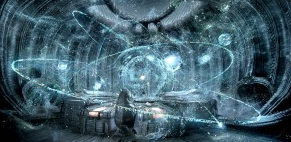 The second Prometheus trailer came out on Sunday March 18, and it fills in a bit more of the story than the rapid cuts of the first, more atmospheric trailer. In my original article about that first trailer, I was mostly concerned that with his new film, director Ridley Scott would simply rehash Alien, the film it aims to tell the back story of. However, in this new trailer, we see a glimpse of something new, something that isn’t a simple monster movie plot. At the heart of this movie is the astrobiological theory of exogenesis.
The second Prometheus trailer came out on Sunday March 18, and it fills in a bit more of the story than the rapid cuts of the first, more atmospheric trailer. In my original article about that first trailer, I was mostly concerned that with his new film, director Ridley Scott would simply rehash Alien, the film it aims to tell the back story of. However, in this new trailer, we see a glimpse of something new, something that isn’t a simple monster movie plot. At the heart of this movie is the astrobiological theory of exogenesis.
The original Alien film, and by extrapolation James Cameron’s sequel Aliens, relied heavily on the biological principles of invasive viral reproduction and metamorphosis to convey a sense of realism and depth to a relatively simple monster in a dark house storyline. In Prometheus, we mercifully also seem to have something new, the theory of exogenesis, or the theory that life on Earth originated elsewhere in the Universe. The scientists discover clues, seemingly on Earth, that apparently leads them to a planet where they encounter the enigmatic Space Jockey and his not quite derelict Alien Derelict. On the one hand, this is pretty good news. I can go into that first screening without that specific worry about this film being a copy of Alien.
But on the other hand, I’m not a fan of exogenesis. For one thing, it’s a bit of a cop-out. Evolution and science deserve a clean win against the forces of mythology and religion, in the perverse debate that decides what facts we teach children about how life began. Second, there is no direct evidence for it, no fossil record, no nothing. And of course, there is no credible working theory out there to explain how this would even come about. It’s purely fanciful. Plus, there was already a Star Trek: The Next Generation two-parter about a master humanoid race that seeded the galaxy’s Class M planets with their descendants. So it’s a little sideways for my taste, and it’s been done.
Why am I getting bent out of shape on the quality of the theory that is the basis for a work of fiction? Because that’s what hard science fiction does best. It takes what we know to be true about the Universe, and twists it. For example, in Foundation, Isaac Asimov took psychology and the predictability of large numbers of gas molecules to derive psychohistory. In The Fountains of Paradise, Arthur C. Clarke’s characters actually build the space elevator dreamed up by Russian astrophysicists. And to be less elitist in my science fiction, David Twohy’s The Arrival has Charlie Sheen exploring terraforming in pure winning fashion. So yes, it matters if the underlying theory is credible to start with.
Am I wrong in identifying the theory in Prometheus? I think the trailer is pretty clear that exogenesis is the driving principle. I don’t think the movie will go in a different direction. But at the same time, it is just a movie, perhaps I should ease up a bit. These kinds of clenched hopes and expectations around a prequel to a science fiction masterpiece haven’t worked out well for me in the past. And perhaps I should just let Mr. Scott tell his story, after all, his track record in genre is unbeatable.
